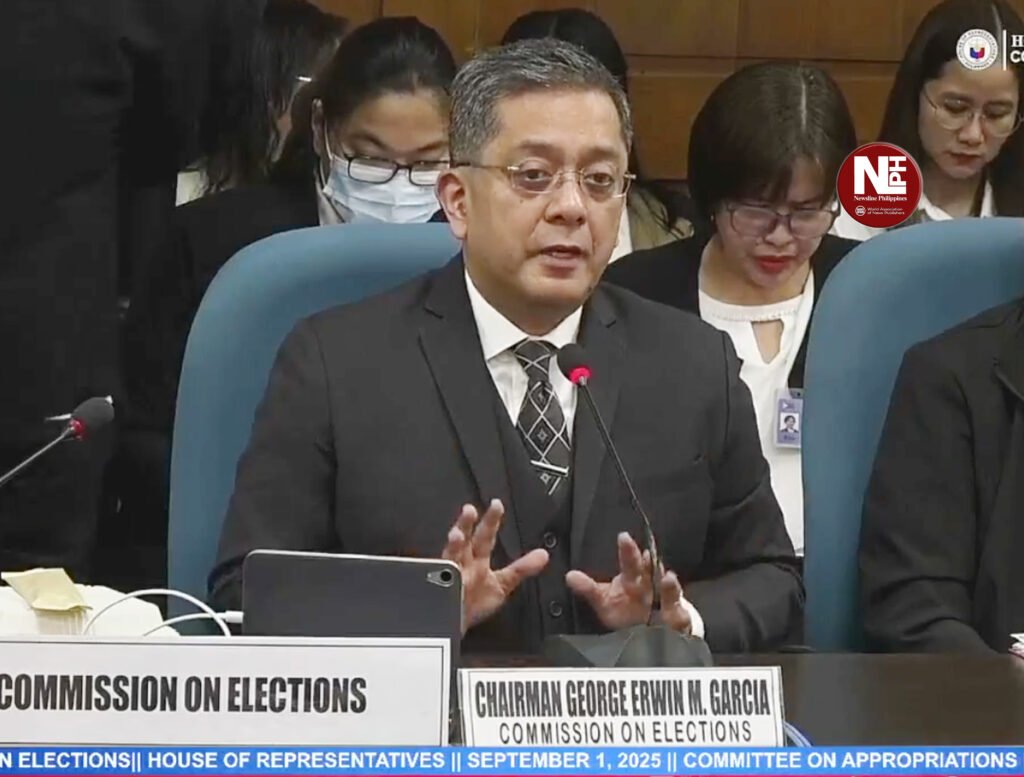
MANILA (September 2) — George Garcia, chair of the Commission on Elections, urged lawmakers to increase the poll body’s 2026 budget, pointing out that the existing plan does not include funds for the Barangay and Sangguniang Kabataan elections.
During the budget briefing held by the House Appropriations Panel on Monday, September 1, Garcia stated that the executive branch had only suggested P11.85 billion for the poll body, which was less than its 2026 proposal of P18.07 billion.
Despite President Ferdinand “Bongbong” Marcos Jr. signing Republic Act 12232 into law, which extends the term of barangay and SK officials to four years and postpones the elections until November 2026, the proposed budget does not include funding for the Barangay and Sangguniang Kabataan Elections (BSKE). But when the budget proposal was created, it was assumed that the original timeline would be followed.
Garcia claimed that despite congressional moves to boost financing for the baragany elections last year, the 2025 General Appropriations Act maintained the P11.6 billion allotment that the 2025 National Expenditure Program was proposing.
Garcia claims that the P2,000 raise in honoraria for poll workers and teachers is not included in the P11.6 billion budget.
The recently passed law is also being contested in the Supreme Court, which is making issues more complicated and raising questions about the Comelec’s financial requirements.
According to Garcia, barangay elections would still be held in December unless the Supreme Court declares the law illegal.
More teachers are necessary when the number of voters increases. He emphasized that this presents two concerns. First, the existing budget is insufficient to meet the necessary raises in pay for BSKE volunteer poll workers and teachers.
Second, if the polls are pushed back until 2026, no more funding will be available to meet the increased number of voters.
If the December 1 Barangay and SK Elections go ahead, none of the teachers who are scheduled to participate will get the extra P2,000 honoraria.
Honorarium rates
Electoral board chairpersons are paid P12,000, while poll clerks and third members are paid P11,000 each. Support staff are paid the same as administrative staff: P8,000. Supervisors at the Department of Education (DepEd) are paid P11,000, while technical staff is paid P9,000. The midterm elections included 758,459 poll workers.
The P2,000 across-the-board salary increase was approved after the Department of Budget and Management (DBM) approved Comelec’s proposal, with the funds for poll workers coming from the President’s Office contingent fund.
Aside from the unfunded pay increase, Garcia stated that there is enough money to recruit extra precinct staff or undertake a voter education campaign, despite the fact that voter registrations are likely to increase by almost 4 million.
More than 2.7 million Filipinos registered to vote in August.
Garcia further stated that deployment and training expenditures were removed from the budget, resulting in a P8 billion shortfall in appropriations.
Garcia stated before the appropriations committee that the Comelec would require approximately P9 billion to adequately stage the elections, especially if they are finally pushed back to November 2026 due to the predicted increase in voter turnout.
This would necessitate more election materials, including separate ballots. It could also require more ballot boxes and teachers to accommodate the expected increase in voters per precinct.
While 60,000 ballot boxes have already been ordered for December, Garcia believes they may not be enough if elections are held next year instead.
Although the national and local elections were automated, the barangay polls will remain completely manual.
Manual elections in the Philippines have long been vulnerable to ballot box stealing and intimidation of electoral board members and canvassers.
Since 2016, the barangay election has been repeatedly postponed, with politicians blaming the delay on a lack of time for officials to carry out their plans.

